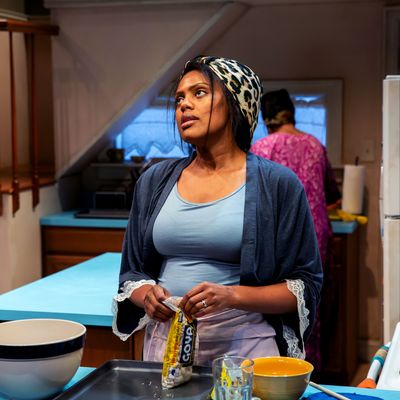
At some point in the past decade, the living-room play turned into the kitchen play. What we once used as visual shorthand for American domesticityÔÇöthe couchÔÇöhas become the kitchen table. Maybe itÔÇÖs because the kitchen is where we talk (the couch is for Netflix); maybe itÔÇÖs because playwrights have stopped imagining they could ever afford a parlor. If thereÔÇÖs a sofa in a new play now, usually itÔÇÖs a satire about the upper crust. But when you enter the warm, well-used kitchen of Zora HowardÔÇÖs STEW, with vegetables on the cutting board and a pot already bubbling on the stove, you expect something familiar in all senses of the word: ordinary, intimate, recognizable andÔÇösince we know why American playwrights have always been preoccupied with the nuclear unitÔÇöallegorical.
Howard, a writer who wears her literary seriousness extremely lightly, likes to tell you what sheÔÇÖs doing as she does it. So we pay attention when Mama (Portia), a materfamilias and prickly moral stickler, explains how to cook a stew. ÔÇ£What youÔÇÖre waiting on is layers,ÔÇØ Mama says, ÔÇ£Each layer to settle down and the next one to stack on top of the one before it.ÔÇØ HowardÔÇÖs first layer is domestic comedy, with PortiaÔÇÖs two daughters, 30-something Lillian (Nikkole Salter) and teenage Nelly (Toni Lachelle Pollitt), and LillianÔÇÖs preteen daughter LilÔÇÖ Mama (Kristin Dodson) all running afoul of MamaÔÇÖs temper in gloriously tetchy ways. ItÔÇÖs very, very early in the morning, and thereÔÇÖs a lot of food to prepareÔÇöfor some unnamed church functionÔÇöand the women all keep stepping on one anotherÔÇÖs ragged nerves. The younger ones all got up on the wrong side of the bed (a car blowing out its tire has startled them awake), and theyÔÇÖre begging to be allowed back to sleep. But ÔÇ£You know who else was tired?ÔÇØ Mama thunders. ÔÇ£JESUS.ÔÇØ A lot of the playÔÇÖs comic texture is this sort of righteous smackdown: Portia has a way of looking under her eyelids that says sheÔÇÖs about to wield heavenÔÇÖs holy hammer against someone snapping the beans wrong.
Secrets are boiling away, though, just like the stew. HowardÔÇÖs second layer is the meaty stuff of melodrama. Where are the men in this world? TheyÔÇÖre represented by the trouble they cause. The phone rings and rings, and the news is almost never good. The guys who call include NellyÔÇÖs boyfriend (ÔÇ£HeÔÇÖs not my boyfriend, heÔÇÖs my man,ÔÇØ she tells LilÔÇÖ Mama) and LilÔÇÖ MamaÔÇÖs father, who never seems to want to talk to Lillian; there might even be a Wells Fargo guy calling about MamaÔÇÖs mortgage. The era is left deliberately a little vague, but certainly weÔÇÖre not in the cell-phone age: HowardÔÇÖs revelation-heavy dramaturgy would fall apart. For a long time, weÔÇÖre kept busy unearthing the small tragedies under the comedy. We think we know whatÔÇÖs hidden, so we feel satisfied and even a little bored when we find each nuggetÔÇöeach pregnancy, each betrayal, each sorrow. ItÔÇÖs familiar stuff.
Director Colette Robert keeps the pace at a flat-out gallop, so it takes a while to realize that thereÔÇÖs another layer in HowardÔÇÖs play. Existentially, somethingÔÇÖs amiss. Why, for instance, do all the women have versions of the same name? Why do they fall into so many of the same patterns? Is their closeness genetic? Or is some other slippage happeningÔÇöthe traumas of generations actually fusing, somehow, into one another? Explanations bubble up, loops begin to close, but weÔÇÖre out on the street outside the theater before they fully register. The shift in touch here is deft: Howard moves from broad strokes to ontological bewilderment almost before you know it. Moments from the middle of the play when LilÔÇÖ Mama was being coached for an audition for Richard III seem like clues. Richard was a master of misdirection too.
The new-play heroes at Page 73 Productions have fielded yet another handsome show, this one relying heavily on Lawrence E. Moten IIIÔÇÖs set, which makes the little Walkerspace theater seem like it could actually contain a two-story house. Avi AmonÔÇÖs clever sound designÔÇöoutside noises and gospel songs on the radioÔÇöintroduces capital-M Mystery on a subconscious level, long before the play itself gestures in that direction. Still, itÔÇÖs the performances that youÔÇÖll remember. TheyÔÇÖre all strong, from Dodson, practiced at eye-rolling suffering, to Pollitt, who manages to be a bratty 17-year-old while still hanging onto our sympathy, to Salter, who achieves a weary glamour in her pajamas and head wrap. But Portia is the jewel. During the Richard III coaching sequence, she stands on a landing as if itÔÇÖs a royal balcony, declaiming a tortured, queenly eulogy from Shakespeare. The play hasnÔÇÖt shifted at this point; we still think itÔÇÖs a rollicking family entertainment. Yet out of nowhere, Portia summons up an entire tragedy. ItÔÇÖs a strange scene, in which one play seems to be trying to break through the one weÔÇÖre watching. ItÔÇÖs also a precise fusion of performance and composition. Howard makes us hear hundreds of years of pain, knocking to be let in. And PortiaÔÇöshaking with effortÔÇöis the door.
Stew is at Walkerspace through February 22.


